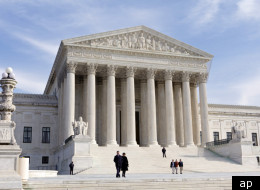Corporate Immunity Looks Likely: Supreme Court Seems Ready To Side With Shell In Human Rights Suit

The Court was hearing oral argument in Kiobel v. Royal Dutch Petroleum, which was brought under a founding-era law, commonly called the Alien Tort Statute, that allows foreign nationals to bring civil lawsuits in U.S. federal courts "for a tort only, committed in violation of the law of nations or a treaty of the United States." The 12 Nigerian plaintiffs contend that Shell Oil's parent company aided and abetted the Nigerian government in its torture and extrajudicial killing of environmental and human rights protesters resisting Shell's operations in Nigeria in the 1990s.
At the very start of the argument, Justice Anthony Kennedy quoted from a brief submitted by Chevron in support of its fellow multinational oil company that "international law does not recognize corporate liability."
"I was trying to find the best authority you have to refute that proposition," Kennedy told the Nigerians' lawyer, Paul Hoffman.
Hoffman responded that the United Kingdom and the Netherlands have somewhat similar laws on their books. Problem is, those two countries submitted briefs opposing Hoffman's position in this case.
Chief Justice John Roberts and Justices Samuel Alito and Antonin Scalia also expressed hostility to the notion of corporate liability under the Alien Tort Statute. This lawsuit, Alito noted, was brought by foreign plaintiffs against a foreign defendant for acts that took place in a foreign country. "What business does a a case like that have in the courts of the United States?" he asked Hoffman.
Justice Ruth Bader Ginsburg tried to push back against Alito's line of questioning, noting that the Supreme Court has already allowed such cases to be brought under the Alien Tort Statute. The question in Kiobel, she reminded her colleagues, is whether only individuals, as opposed to corporate entities, can be sued.
Attorney Kathleen Sullivan, representing Royal Dutch Petroleum, faced intense questioning from Justice Elena Kagan that highlighted the irreconcilable divide between the two sides' arguments. Sullivan contended that there was no norm of corporate liability in international law courts and conventions, while Kagan said that silence in the international sources did not create corporate immunity. Their back-and-forth ended as a stalemate between two career contemporaries: Both women are former deans of the country's best law schools -- Sullivan at Stanford, Kagan at Harvard.
In the end, however, Sullivan appeared to have the Court's five-justice majority of Republican appointees on her side, if the typically silent Justice Clarence Thomas sticks to his previously expressed narrow views on the Alien Tort Statute and general pro-business bent.
A decision in the case is expected by the end of Ju
